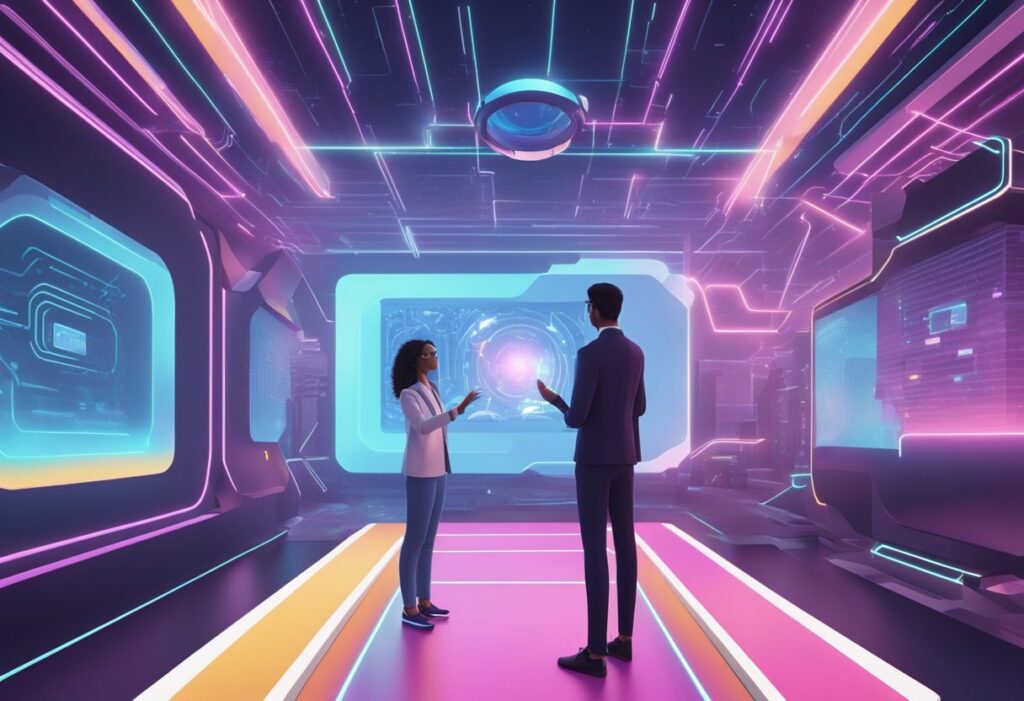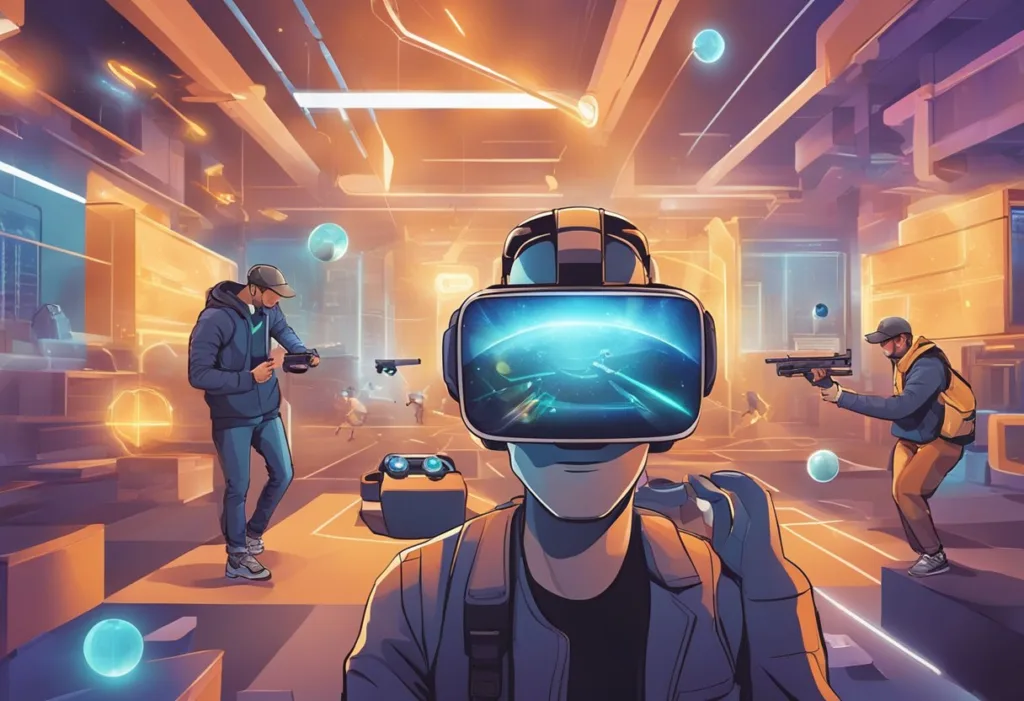The Metaverse is a term used to describe a virtual space that is designed to be a fully immersive experience for users. It is a vision of a future where people can interact with each other in a digital world that is as real as the physical one. The concept of the Metaverse has been around for decades, but it is only in recent years that advancements in technology have made it possible to create a truly immersive experience. In this blog post, we will explore AI in metaverse and how the two technology work together.
Artificial intelligence (AI) is one of the key technologies that will drive the development of the Metaverse. AI can be used to create intelligent agents that can interact with users in a natural and intuitive way. These agents can provide users with information, help them navigate the virtual world, and even assist them in completing tasks. AI can be used to create more realistic and lifelike environments that are indistinguishable from the real world.
Understanding the Metaverse and AI
The Metaverse is a virtual world where people can interact with each other and digital objects in a shared space. It is a concept that has been around since the early days of the internet, but it is now becoming a reality thanks to advances in technology, particularly in artificial intelligence (AI).
AI is the ability of computers to perform tasks that normally require human intelligence, such as visual perception, speech recognition, decision-making, and language translation. In the Metaverse, AI is used to create more immersive and engaging experiences for users.
The Role of AI in Virtual Worlds
AI plays a crucial role in the development of virtual worlds. It can be used to create more realistic environments, characters, and objects, as well as to improve the interactions between users and the virtual world.
For example, AI can be used to create intelligent NPCs (non-player characters) that can interact with users in more natural and realistic ways. AI can also be used to create dynamic and responsive environments that change based on user input. This makes the virtual world more engaging and immersive for users.
Evolution of Internet Experiences
The Metaverse represents the next evolution of internet experiences. It is a more immersive and interactive version of the internet that allows people to interact with each other and digital objects in a shared space.
AI is a key component of the Metaverse, as it enables more natural and realistic interactions between users and the virtual world. As the technology continues to evolve, we can expect to see even more advanced AI systems being used in the Metaverse, creating even more engaging and immersive experiences for users.
AI is a foundational pillar for building the Metaverse. It enables the creation of more immersive and engaging experiences for users, and it is essential for the development of intelligent NPCs, dynamic environments, and responsive objects.
As the Metaverse continues to evolve, we can expect to see even more advanced AI systems being used to create even more engaging and immersive experiences for users.
How AI is used in the Metaverse
AI is an essential technology in the Metaverse, and it plays a crucial role in shaping the virtual world. Here are five ways AI is used in the Metaverse:
1. Content Generation
Generative AI is used to create new content, such as text, images, audio, and video. This technology allows developers to create vast amounts of content quickly and efficiently, which is crucial in building a vast and diverse Metaverse.
2. Personalization
AI is used to personalize the Metaverse experience for each user. By analyzing user data, AI can recommend content, products, and services that are tailored to each user’s preferences and needs. This personalization can help users feel more connected to the Metaverse and improve their overall experience.
3. Chatbots
Chatbots are AI-powered virtual assistants that can interact with users in the Metaverse. They can help users navigate the virtual world, answer questions, and provide assistance. Chatbots are especially useful in large and complex virtual environments where users may need help finding their way around.
4. Security
AI is used to enhance security in the Metaverse. It can detect and prevent fraud, cyber-attacks, and other security threats. AI can also monitor user behavior and identify suspicious activity, which can help prevent crime and protect users’ privacy.
5. Analytics
AI is used to collect and analyze data in the Metaverse. This data can provide valuable insights into user behavior, preferences, and trends. By analyzing this data, developers can make informed decisions about how to improve the Metaverse and make it more engaging and enjoyable for users.
AI is an essential technology in the Metaverse, and it will continue to play a crucial role in shaping the future of virtual worlds.

AI Supercomputers and Algorithms
The Metaverse is a complex, immersive digital world that requires powerful computing capabilities to function seamlessly. AI supercomputers and algorithms play a crucial role in the development and maintenance of the Metaverse.
These supercomputers are designed to handle large amounts of data and perform complex calculations at lightning speeds. They are also equipped with advanced machine learning algorithms that can analyze data and make predictions to improve the overall user experience.
Nvidia is one of the leading companies in the development of AI supercomputers and algorithms for the Metaverse. Their powerful graphics processing units (GPUs) are used to power some of the most popular Metaverse platforms, such as Second Life and Decentraland. These GPUs are designed to handle complex graphics and render high-quality visuals in real-time.
Blockchain and Digital Twins
Blockchain technology is another critical component of the Metaverse’s technological infrastructure. Blockchain provides a secure and decentralized platform for transactions, making it ideal for Metaverse platforms that require a high level of security and transparency. Digital twins are also an essential part of the Metaverse’s infrastructure. They are virtual replicas of real-world objects and assets, enabling users to interact with them in the Metaverse.
Companies like Siemens are investing heavily in blockchain and digital twin technologies to enable the industrial Metaverse. Siemens is developing a range of AI-powered tools and platforms that enable users to interact with digital twins in real-time, improving the overall user experience.
Networking and Connectivity
Networking and connectivity are crucial components of the Metaverse’s technological infrastructure. The Metaverse requires a high-speed, low-latency network to function correctly. The network must be capable of handling large amounts of data and providing fast, reliable connectivity to users worldwide.
5G technology is set to play a crucial role in the Metaverse’s networking and connectivity infrastructure. 5G networks provide high-speed, low-latency connectivity, enabling users to interact with the Metaverse in real-time. Companies like Deloitte are investing heavily in 5G technology to improve the overall user experience of the Metaverse. Deloitte believes that 5G technology will be critical in enabling the Metaverse to reach its full potential.
AI-Driven Experiences in the Metaverse
The integration of AI in the metaverse has revolutionized the way users interact and experience the virtual world. AI-powered assistants facilitate seamless interactions, providing users with instant information and navigation tools that optimize user movement within the virtual world.
This section explores the various AI-driven experiences in the metaverse, including virtual real estate and commerce, gaming and entertainment, education, and collaboration.
Virtual Real Estate and Commerce
AI has transformed the way users interact with virtual real estate and commerce in the metaverse. AI-powered chatbots and virtual assistants provide users with personalized recommendations, making it easier to find the right products and services. AI-powered virtual real estate agents help users find the perfect virtual property based on their preferences and budget.
Gaming and Entertainment
AI has played a significant role in revolutionizing the gaming and entertainment industry in the metaverse. AI-powered game characters and NPCs provide users with a more immersive gaming experience, making the virtual world more realistic and engaging. AI-powered virtual assistants help users find the right games and entertainment options based on their preferences.
Education and Collaboration
AI has transformed the way users learn and collaborate in the metaverse. AI-powered virtual tutors and mentors provide personalized learning experiences, making it easier for users to learn and acquire new skills. AI-powered virtual assistants help users collaborate with others in the virtual world, making it easier to work on projects and share ideas.
AI has transformed the way users interact and experience the metaverse. From virtual real estate and commerce to gaming and entertainment, education, and collaboration, AI-powered experiences have made the virtual world more engaging, immersive, and personalized.
Challenges and Considerations
Privacy and Security
As with any online platform, privacy and security are major concerns in the metaverse. The use of AI in the metaverse poses unique challenges in protecting user data and preventing unauthorized access. AI-powered virtual assistants, for instance, may collect and store user data, which could be vulnerable to hacking or misuse. Users may be at risk of identity theft or cyberattacks if their personal information is not properly secured.
To address these challenges, developers must implement robust security measures, such as encryption and multi-factor authentication, to protect user data. They must also ensure that users are aware of the data being collected and how it will be used, and give them the ability to control their data.
Ethical Implications and Bias
The use of AI in the metaverse also raises ethical concerns, particularly in relation to bias. AI algorithms can perpetuate existing biases and discrimination, leading to unequal treatment of users. For example, AI-powered content moderation tools may be biased against certain groups, leading to censorship or suppression of their content.
To address these issues, developers must ensure that AI algorithms are designed to be fair and unbiased. They must also regularly monitor and audit AI systems to identify and address any biases that may arise. They must provide users with transparency into how AI is being used in the metaverse and give them the ability to report any instances of bias or discrimination.
Misinformation and Content Moderation
The metaverse is a vast, decentralized network of virtual spaces, making it difficult to monitor and regulate content. AI-powered content moderation tools can help to identify and remove harmful or inappropriate content, but they are not foolproof. Misinformation and fake news can still spread rapidly in the metaverse, leading to harmful consequences.
To address these challenges, developers must implement effective content moderation strategies, including a combination of AI and human moderation. They must also provide users with tools to report and flag inappropriate content, and ensure that they have access to accurate information. They must work to promote digital literacy and critical thinking skills among users to help them identify and avoid misinformation.
While AI has the potential to revolutionize the metaverse, it also poses significant challenges and considerations. Developers must work to address these challenges and ensure that the metaverse is a safe, ethical, and inclusive space for all users.
Future Directions and Innovations
Advancements in AI Technology
The integration of AI technology in the metaverse has seen tremendous growth in recent years. The generative AI market in the metaverse is expected to grow from $29.7 million in 2022 to around $428.9 million by 2032, indicating a CAGR of 31.5%. This growth is mainly due to advancements in AI technology, which have enabled the development of more sophisticated and intelligent virtual environments.
One of the most significant innovations in AI technology is the universal speech translator, which allows users to communicate with others in the metaverse regardless of their language. This innovation has the potential to revolutionize virtual communication and make the metaverse more inclusive and accessible to people from different parts of the world.
Emerging Trends in Virtual Interaction
The metaverse has also seen the emergence of new trends in virtual interaction, which are shaping the future of the digital world. One of these trends is the use of smart cities, which are virtual environments that simulate real-world urban environments. Smart cities are designed to be sustainable, efficient, and user-friendly, and they offer a range of benefits to users, including improved quality of life and reduced environmental impact.
Another emerging trend in virtual interaction is the use of healthcare applications in the metaverse. Healthcare applications are designed to provide users with access to medical services and information in a virtual environment. This innovation has the potential to revolutionize healthcare delivery and make healthcare more accessible and affordable to people from all walks of life.
The Impact on Society and Industry
The integration of AI technology in the metaverse is having a significant impact on society and industry. AI is already a key cornerstone of the development of the metaverse, and the latest iteration of generative AI goes a significant step further, making it quicker and easier to transform ideas into reality.
The impact of AI on society and industry is expected to be far-reaching, with the potential to create new industries and jobs, improve productivity, and enhance quality of life. However, it is also important to consider the potential risks and challenges associated with the integration of AI in the metaverse, such as privacy concerns, ethical considerations, and the potential for AI to exacerbate existing inequalities.
Frequently Asked Questions
How does AI enhance user experience in virtual environments?
AI enhances user experience in virtual environments by providing personalized recommendations and suggestions based on user behavior and preferences. AI algorithms can analyze user data to create customized experiences that cater to individual needs. AI-powered virtual assistants can provide instant support and guidance to users, enhancing their overall experience.
What are the potential applications of AI in the development of metaverse platforms?
AI has the potential to revolutionize the development of metaverse platforms by enabling advanced features such as realistic physics simulations, natural language processing, and predictive analytics. AI can also be used to create intelligent NPCs (non-player characters) that respond to user actions in real-time, enhancing the overall immersion and interactivity of the metaverse.
What challenges do developers face when integrating AI into metaverse ecosystems?
Developers face several challenges when integrating AI into metaverse ecosystems, including data privacy concerns, algorithmic bias, and the need for robust infrastructure to support AI-powered applications. Developers must ensure that AI algorithms are transparent and explainable, to build trust and credibility with users.
In what ways can AI contribute to the realism and interactivity of the metaverse?
AI can contribute to the realism and interactivity of the metaverse by enabling advanced physics simulations, natural language processing, and predictive analytics. AI can also be used to create intelligent NPCs that respond to user actions in real-time, enhancing the overall immersion and interactivity of the metaverse.
How do generative AI models influence content creation within the metaverse?
Generative AI models can influence content creation within the metaverse by enabling the creation of realistic 3D models and environments. AI algorithms can generate complex textures, lighting effects, and other visual elements that would be difficult or time-consuming to create manually. This can enable developers to create more engaging and immersive experiences for users.
What distinguishes AI-driven virtual assistants from other AI applications in the metaverse?
AI-driven virtual assistants are distinguished from other AI applications in the metaverse by their ability to provide instant support and guidance to users. Virtual assistants can respond to user queries in natural language, providing personalized recommendations and suggestions based on user behavior and preferences. This can enhance the overall user experience and improve engagement within the metaverse.














